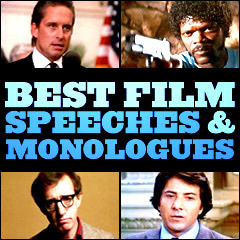|
Best Film Speeches and Monologues
|
|
Title Screen
|
Film Title/Year and Description of Film Speech/Monologue |
Screenshots
|
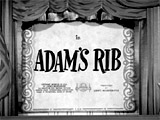
|
Adam's Rib (1949)
Screenwriter(s): Ruth Gordon, Garson Kanin
 Defense
of Murder Defense
of Murder
Play clip (excerpt): 
Amanda Bonner's (Katharine Hepburn) closing argument
in court to defend the actions of her client Doris Attinger
(Judy Holliday), using the principle of equality before the
law. In a "revealing experiment" to reverse the couple's
sex-stereotyped roles, she asked the jury to imagine the defendant
Mrs. Attinger as a home-protecting man, to picture "slick
home-wrecker" Miss Caighn as a predatory wolfish man (with
short dark hair and a mustache), and to fantasize that Mr.
Attinger was a woman (with blonde hair).
The camera showed the action through the eyes
of the jurors - each of the three characters were momentarily
transformed. Amanda defended the "unwritten law" -
the passionate-lover defense that allowed a man to break the
law to save his home by killing his wife when caught in bed
with a lover. And she argued that the wife Doris [and by extension
all women] was entitled to the same defense and justice in
the courts that a man received, whatever that justice may be:
And so the question here is equality before
the law, regardless of religion, color, wealth, or, as
in this instance, sex...Law, like man, is composed of two
parts: Just as man is body and soul, so is the law, letter
and spirit. The law says, 'Thou shalt not kill,' yet men have killed,
and proved a reason, and been set free. Self-defense, defense
of others, of wife, of children, and home. If a thief breaks
into your house, and you shoot him, the law will not deal
harshly with you, nor indeed should it. So here, you are
asked to judge not whether or not these acts were committed,
but to what extent they were justified. Now, ladies and
gentlemen of the jury, I request that you join me in a
revealing experiment. I ask you all to direct your attention
to the defendant, Mrs. Attinger. Now keep looking at her,
keep watching. Listen carefully and look at her. Look at
her hard. Now imagine her a man. Go on now, use your imaginations.
Think of her as a man sitting there accused of a like crime
-- a husband, who is only trying to protect his home.
Now hold it. Hold that impression and look
at Beryl Caighn. Look at her. Look at her hard, a man, a
slick home wrecker, a third party, a wolf! You know the type.
Alright, hold that impression and look at Mr. Attinger, and
suppose him a woman. Try, try hard. Ah, yes, there she is.
The guilty wife! Look at her! Does she arouse your sympathy?!
Alright! Now you have it! Judge it so! An unwritten law stands
back of a man who fights to defend his home. Apply this same
law to this maltreated wife, and neglected woman. We ask
you no more: equality. Deep in the heart of South America,
there thrives today a civilization far older than ours: a
people known as the Loquiňanos, descended from the Amazons.
In this vast tribe, members of the female sex rule and govern,
and systematically deny equal rights to the men, made weak
and puny by years of subservience, too weak to revolt. And
yet, how long have we lived in the shadow of a like injustice?
Consider this unfortunate woman's act as though
you yourselves had each committed it. Every living being
is capable of attack, if sufficiently provoked. Assault lies
dormant within us all. It requires only circumstance to set
it in violent motion. I ask you for a verdict of not guilty.
There was no murder attempt here, only a pathetic attempt
to save a home.
|
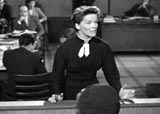
|
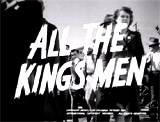
|
All the King's
Men (1949)
Screenwriter(s): Robert Rossen
 Rousing
Campaign Speech for Governor Rousing
Campaign Speech for Governor
Play clip (excerpt): 
Willie Stark (Broderick Crawford) gave a no-notes
rousing, half-drunken campaign speech at a fairgrounds barbecue,
during his campaign for Louisiana governor, when he threw away
his prepared speech:
My friends, my friends, I have a speech
here. It's a speech about what this state needs. There's
no need in my telling you what this state needs. You are
the state and you know what you need. You over there, look
at your pants. Have they got holes in the knees? Listen
to your stomach. Did you ever hear it rumble for hunger?
And you, what about your crops? Did they ever rot in the
field because the road was so bad you couldn't get 'em
to market? And you, what about your kids? Are they growin'
up ignorant as dirt, ignorant as you 'cause there's no
school for 'em?
Naw, I'm not gonna read you any speech. But
I am gonna tell ya a story. It's a funny story so get ready
to laugh....Get ready to bust your sides laughin', 'cause
it's sure a funny story. It's about a hick, a hick like you,
if ya please. Yeah, like you. He grew up on the dirt roads
and the gully washes of a farm. He knew what it was to get
up before dawn and get feed and slop and milk before breakfast,
and then set out before sunup and walk six miles to a one-room,
slab-sided schoolhouse.
Aw, this hick knew what it was to be a hick,
all right. He figured if he was gonna get anything done,
well, he had to do it himself. So he sat up nights and studied
books. He studied law, because he thought he might be able
to change things some - for himself and for folks like him.
Now I'm not gonna lie to ya. He didn't start off thinkin'
about the hicks and all the wonderful things he was gonna
do for 'em. Naw, naw, he started off thinkin' of number one.
But somethin' came to him on the way. How he
could do nothin' for himself without the help of the people.
That's what came to him. And it also came to him with the
powerful force of God's own lightning back in his home county
when the school building collapsed 'cause it was built of
politics' rotten brick. It killed and mangled a dozen kids.
But you know that story. The people were his friends because
he'd fought that rotten brick. And some of the politicians
down in the city, they knew that, so they rode up to his
house in a big, fine, shiny car and said as how they wanted
him to run for Governor....And he swallowed it. He looked
in his heart and he thought in all humility, how he'd like
to try and change things. He was just a country boy who thought
that even the plainest, poorest man can be Governor if his
fellow citizens find he's got the stuff for the job. All
those fellas in the striped pants, they saw that hick and
they took him in...
There he is! There's your Judas Iscariot! Look
at him! ...Look at him....! (Chaos) Now, shut up!
Shut up, all of ya! Now listen to me, ya hicks. Yeah, you're
hicks too, and they fooled you a thousand times just like
they fooled me. But this time, I'm gonna fool somebody. I'm
gonna stay in this race. I'm on my own and I'm out for blood.
Now listen to me, you hicks! Listen to me, and lift up your
eyes and look at God's blessed and unfly-blown truth.
And this is the truth! You're a hick, and nobody
ever helped a hick but a hick himself! Alright, listen to
me! Listen to me! I'm the hick they were gonna use to split
the hick vote. Well, I'm standin' right here now on my hind
legs. Even a dog can learn to do that. Are you standin' on
your hind legs? Have you learned to do that much yet? Here
it is! Here it is, ya hicks! Nail up anybody who stands in
your way! Nail up Joe Harrison! Nail up McMurphy! And if
they don't deliver, give me the hammer and I'll do it myself!
|
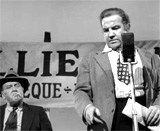
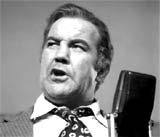
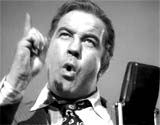
|
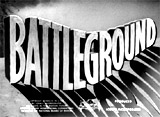
|
Battleground (1949)
Screenwriter(s): Robert Pirosh
 An
Answer to the $64 Question: "Was This Trip Necessary?" --
"There Was Nothing Left to Do But Fight" - Against
the Nazis and Fascism An
Answer to the $64 Question: "Was This Trip Necessary?" --
"There Was Nothing Left to Do But Fight" - Against
the Nazis and Fascism
The Chaplain (Leon Ames) delivered an outdoor
sermon during an inter-faith service for soldiers of the 101st
Airborne Division when they were trapped in the wintry, besieged
French city of Bastogne during WWII's Battle of the Bulge:
Now it's nearly Christmas, and here we are
in beautiful Bastogne enjoying the winter sports. (laughter)
And the $64 dollar question is: 'Was this trip necessary?'
I'll try to answer that, but my sermons, like everything
else in the Army, depend on the situation and the terrain.
So I assure you this is gonna be a quickie! 'Was this trip
necessary?' Well, let's look at the facts. Nobody wanted
this war but the Nazis. A great many people tried to deal
with them, and a lot of 'em are dead. Millions have died
for no other reason except that the Nazis wanted 'em dead.
So, in the final showdown, there was nothing left to do
except fight.
There's a great lesson in this. And those of
us who've learned it the hard way aren't gonna forget it.
We must never again let any force dedicated to a super-race,
or a super-idea, or super-anything become strong enough to
impose itself upon a free world. We must be smart enough
and tough enough in the beginning to put out the fire before
it starts spreading. My answer to the $64 dollar question
is, yes. This trip was necessary.
As the years go by, a lot of people are gonna
forget, but you won't. And don't ever let anybody tell you
you were a sucker to fight in the war against fascism. And
now, Jerry permitting, let us pray. Let us pray for this
fog to lift. Almighty God... (artillery drowned him out)
The organist is hitting those bass notes a little too loud
for me to be heard. So let us each pray in his own way, to
his own God. (Many of the men knelt)
|

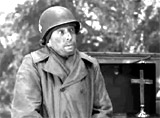
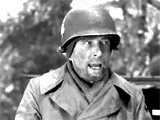

|

|
The Fountainhead (1949)
Screenwriter(s): Ayn Rand
 Closing
Testimony and Summation to a Jury Closing
Testimony and Summation to a Jury
Play clip (excerpt):
Architect Howard Roark (Gary Cooper) made a closing
summation (of author-screenwriter Ayn Rand's treatise on Objectivism)
to a jury, defending his destruction of housing project buildings
that had perverted his original design plans - his words were
so powerful that the jury found him not-guilty:
Thousands of years ago, the first man discovered
how to make fire. He was probably burned at the stake he
had taught his brothers to light, but he left them a gift
they had not conceived and he lifted darkness off the earth.
Throughout the centuries, there were men who took first
steps down new roads, armed with nothing but their own
vision. The great creators, the thinkers, the artists,
the scientists, the inventors, stood alone against the
men of their time. Every new thought was opposed. Every
new invention was denounced. But the men of unborrowed
vision went ahead. They fought, they suffered and they
paid, but they won. No creator was prompted by a desire
to please his brothers. His brothers hated the gift he
offered. His truth was his only motive. His work was his
only goal. His work, not those who used it. His creation,
not the benefits others derived from it. The creation which
gave form to his truth. He held his truth above all things
and against all men. He went ahead whether others agreed
with him or not, with his integrity as his only banner.
He served nothing and no one. He lived for himself. And
only by living for himself was he able to achieve the things
which are the glory of mankind. Such is the nature of achievement.
Man cannot survive except through his mind.
He comes on earth unarmed. His brain is his only weapon.
But the mind is an attribute of the individual. There is
no such thing as a collective brain. The man who thinks must
think and act on his own. The reasoning mind cannot work
under any form of compulsion. It cannot be subordinated to
the needs, opinions, or wishes of others. It is not an object
of sacrifice. The creator stands on his own judgment - the
parasite follows the opinions of others. The creator thinks
- the parasite copies. The creator produces - the parasite
loots. The creator's concern is the conquest of nature -
the parasite's concern is the conquest of men. The creator
requires independence. He neither serves nor rules. He deals
with men by free exchange and voluntary choice. The parasite
seeks power. He wants to bind all men together in common
action and common slavery. He claims that man is only a tool
for the use of others, that he must think as they think,
act as they act, and live in selfless, joyless servitude
to any need but his own.
Look at history. Everything we have, every
great achievement has come from the independent work of some
independent mind. Every horror and destruction came from
attempts to force men into a herd of brainless, soulless
robots, without personal rights, without person ambition,
without will, hope, or dignity. It is an ancient conflict.
It has another name - 'The individual against the collective.'
Our country, the noblest country in the history of men, was
based on the principle of individualism, the principle of
man's 'inalienable rights.' It was a country where a man
was free to seek his own happiness, to gain and produce,
not to give up and renounce. To prosper, not to starve. To
achieve, not to plunder. To hold as his highest possession
a sense of his personal value, and as his highest virtue
his self-respect. Look at the results. That is what the collectivists
are now asking you to destroy, as much of the earth has been
destroyed.
I am an architect. I know what is to come
by the principle on which it is built. We are approaching
a world in which I cannot permit myself to live. My ideas
are my property. They were taken from me by force, by breach
of contract. No appeal was left to me. It was believed that
my work belonged to others, to do with as they pleased. They
had a claim upon me without my consent, that it was my duty
to serve them without choice or reward. Now you know why
I dynamited Courtland. I designed Courtland. I made it possible.
I destroyed it. I agreed to design it for the purpose of
seeing it built as I wished. That was the price I set for
my work. I was not paid. My building was disfigured at the
whim of others who took all the benefits of my work and gave
me nothing in return.
I came here to say that I do not recognize
anyone's right to one minute of my life, nor to any part
of my energy, nor to any achievement of mine, no matter who
makes the claim! It had to be said - The world is perishing
from an orgy of self-sacrificing. I came here to be heard
in the name of every man of independence still left in the
world. I wanted to state my terms. I do not care to work
or live on any others. My terms are - A man's right to exist
for his own sake.
|

|
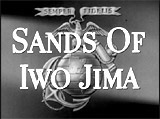
|
Sands of Iwo Jima (1949)
Screenwriter(s): Harry Brown, James Edward Grant
 Words
to Recruits: "I'm Gonna Get the Job Done" Words
to Recruits: "I'm Gonna Get the Job Done"
Play clip (excerpt): 
Tough Marine Sgt. John M. Stryker (John Wayne)
addressed his combat soldiers, a new batch of recruits to fight
in the Pacific theatre of the war as a rifle squad. He was
determined to harshly mold them into fighting men:
My name is Stryker, Sergeant John M. Stryker.
You're gonna be my squad - a rifle squad. Three of us have
seen action: Corporal Dunn, Charlie Bass, and myself. You're
gonna learn from us. In boot camp, you learned out of a
book. Out here, you gotta remember the book and learn a
thousand things that have never been printed, probably
never will be. You gotta learn right and you gotta learn
fast. And any man that doesn't want to cooperate, I'll
make him wish he hadn't been born. Before I'm through with
you, you're gonna move like one man and think like one
man. If you don't, you'll be dead.
Now, you guys have had a nice, easy day. I
hope you enjoyed it because it's the last one you're gonna
get for a long time. You joined the Marines because you wanted
to fight. Well, you're gonna get your chance, and I'm here
to see that you know how. If I can't teach you one way, I'll
teach ya another. But I'm gonna get the job done. Any questions?
That's all.
|
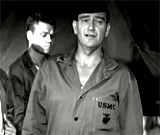
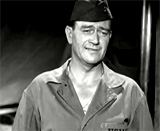
|
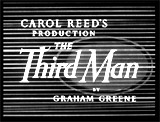
|
The Third
Man (1949, UK)
Screenwriter(s): Graham Greene
 Opening
Voice-Over Narration Opening
Voice-Over Narration
Play clip (excerpt): 
The opening monologue given by Holly Martins
(Joseph Cotten), with two versions of the speech (this is the
original UK version):
I never knew the old Vienna before the war
with its Strauss music, its glamour and easy charm. Constantinople
suited me better. I really got to know it in the classic
period of the Black Market. We'd run anything if people
wanted it enough - mmm - had the money to pay. Of course,
a situation like that does tempt amateurs but you know
they can't stay the course like a professional. Now the
city - it's divided into four zones, you know, each occupied
by a power: the American, the British, the Russian and
the French. But the center of the city that's international
policed by an International Patrol. One member of each
of the four powers. Wonderful! What a hope they had! All
strangers to the place and none of them could speak the
same language. Except a sort of smattering of German. Good
fellows on the whole, did their best you know.
Vienna doesn't really look any worse than a
lot of other European cities. Bombed about a bit. Oh, I was
gonna tell you, wait, I was gonna tell you about Holly Martins,
an American. Came all the way here to visit a friend of his.
The name is Lime, Harry Lime. Now Martins was broke and Lime
had offered him, some sort, I don't know, some sort of job.
Anyway, there he was, poor chap. Happy as a lark and without
a cent.
|
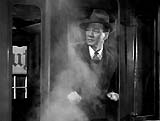
|

|
The Third
Man (1949, UK)
Screenwriter(s): Graham Greene
 Ferris
Wheel Ride "Cuckoo Clock" Speech Ferris
Wheel Ride "Cuckoo Clock" Speech
Play clip (excerpt): 
Harry Lime (Orson Welles) delivered the famous
'cuckoo clock' dialogue after a ferris wheel ride with Holly
Martins (Joseph Cotten):
In Italy for thirty years under the Borgias
they had warfare, terror, murder, bloodshed - but they
produced Michelangelo, Leonardo da Vinci, and the Renaissance.
In Switzerland, they had brotherly love, five hundred years
of democracy and peace, and what did that produce? The
cuckoo clock. So long, Holly.
|
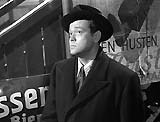
|
